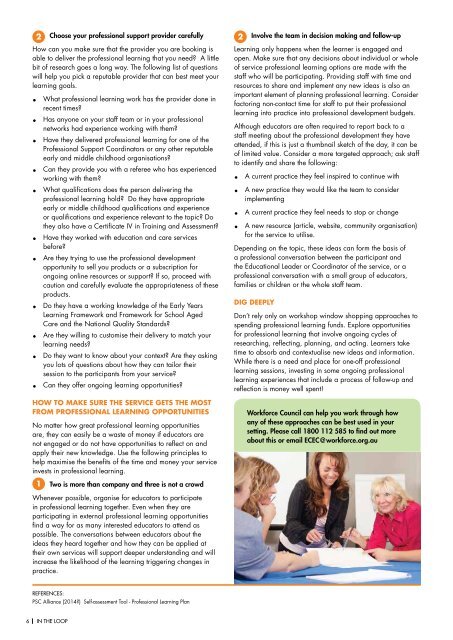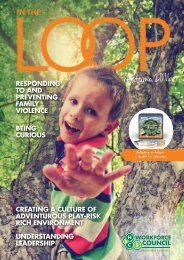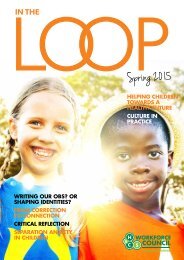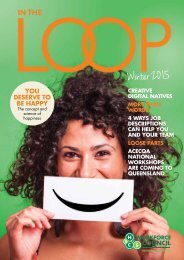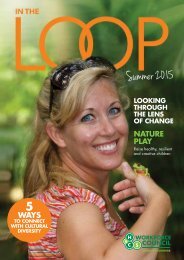Autumn 2015
You also want an ePaper? Increase the reach of your titles
YUMPU automatically turns print PDFs into web optimized ePapers that Google loves.
2 Choose your professional support provider carefully 2<br />
How can you make sure that the provider you are booking is<br />
able to deliver the professional learning that you need? A little<br />
bit of research goes a long way. The following list of questions<br />
will help you pick a reputable provider that can best meet your<br />
learning goals.<br />
• What professional learning work has the provider done in<br />
recent times?<br />
• Has anyone on your staff team or in your professional<br />
networks had experience working with them?<br />
• Have they delivered professional learning for one of the<br />
Professional Support Coordinators or any other reputable<br />
early and middle childhood organisations?<br />
• Can they provide you with a referee who has experienced<br />
working with them?<br />
• What qualifications does the person delivering the<br />
professional learning hold? Do they have appropriate<br />
early or middle childhood qualifications and experience<br />
or qualifications and experience relevant to the topic? Do<br />
they also have a Certificate IV in Training and Assessment?<br />
• Have they worked with education and care services<br />
before?<br />
• Are they trying to use the professional development<br />
opportunity to sell you products or a subscription for<br />
ongoing online resources or support? If so, proceed with<br />
caution and carefully evaluate the appropriateness of these<br />
products.<br />
• Do they have a working knowledge of the Early Years<br />
Learning Framework and Framework for School Aged<br />
Care and the National Quality Standards?<br />
• Are they willing to customise their delivery to match your<br />
learning needs?<br />
• Do they want to know about your context? Are they asking<br />
you lots of questions about how they can tailor their<br />
session to the participants from your service?<br />
• Can they offer ongoing learning opportunities?<br />
Involve the team in decision making and follow-up<br />
Learning only happens when the learner is engaged and<br />
open. Make sure that any decisions about individual or whole<br />
of service professional learning options are made with the<br />
staff who will be participating. Providing staff with time and<br />
resources to share and implement any new ideas is also an<br />
important element of planning professional learning. Consider<br />
factoring non-contact time for staff to put their professional<br />
learning into practice into professional development budgets.<br />
Although educators are often required to report back to a<br />
staff meeting about the professional development they have<br />
attended, if this is just a thumbnail sketch of the day, it can be<br />
of limited value. Consider a more targeted approach; ask staff<br />
to identify and share the following:<br />
• A current practice they feel inspired to continue with<br />
• A new practice they would like the team to consider<br />
implementing<br />
• A current practice they feel needs to stop or change<br />
• A new resource (article, website, community organisation)<br />
for the service to utilise.<br />
Depending on the topic, these ideas can form the basis of<br />
a professional conversation between the participant and<br />
the Educational Leader or Coordinator of the service, or a<br />
professional conversation with a small group of educators,<br />
families or children or the whole staff team.<br />
DIG DEEPLY<br />
Don’t rely only on workshop window shopping approaches to<br />
spending professional learning funds. Explore opportunities<br />
for professional learning that involve ongoing cycles of<br />
researching, reflecting, planning, and acting. Learners take<br />
time to absorb and contextualise new ideas and information.<br />
While there is a need and place for one-off professional<br />
learning sessions, investing in some ongoing professional<br />
learning experiences that include a process of follow-up and<br />
reflection is money well spent!<br />
HOW TO MAKE SURE THE SERVICE GETS THE MOST<br />
FROM PROFESSIONAL LEARNING OPPORTUNITIES<br />
No matter how great professional learning opportunities<br />
are, they can easily be a waste of money if educators are<br />
not engaged or do not have opportunities to reflect on and<br />
apply their new knowledge. Use the following principles to<br />
help maximise the benefits of the time and money your service<br />
invests in professional learning.<br />
1<br />
Two is more than company and three is not a crowd<br />
Workforce Council can help you work through how<br />
any of these approaches can be best used in your<br />
setting. Please call 1800 112 585 to find out more<br />
about this or email ECEC@workforce.org.au<br />
Whenever possible, organise for educators to participate<br />
in professional learning together. Even when they are<br />
participating in external professional learning opportunities<br />
find a way for as many interested educators to attend as<br />
possible. The conversations between educators about the<br />
ideas they heard together and how they can be applied at<br />
their own services will support deeper understanding and will<br />
increase the likelihood of the learning triggering changes in<br />
practice.<br />
REFERENCES:<br />
PSC Alliance (2014?) Self-assessment Tool - Professional Learning Plan<br />
6<br />
IN THE LOOP


